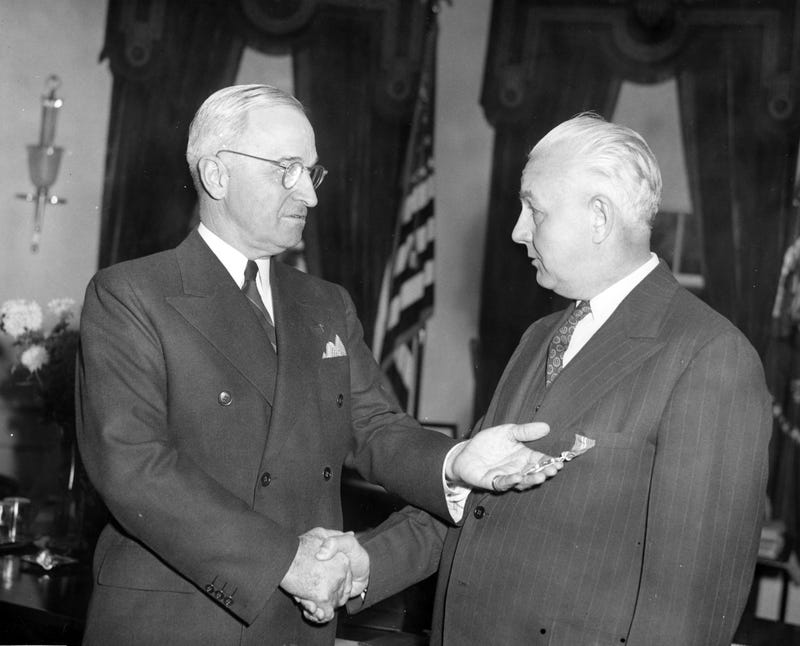Silentium Victoriam Accelerat: "Silence Speeds Victory"
Motto of the U.S. Office of Censorship
The U.S. declared war on Japan on December 8, 1941.1
Executive Order 8985 established the U.S. Office of Censorship on December 19, 1941.2
In January 1942, censorship codebooks were distributed to all American newspapers, magazines, and radio stations with the request that journalists adhere to the guidelines within.3
Byron Price (1891–1981)4 was director of the U.S. Office of Censorship5 during World War II.6 He won a special Pulitzer Prize and was presented a medal of merit by President Truman:
"exceptionally meritorious conduct in the performance of outstanding services as Director, Office of Censorship, from December 20, 1941, until August 15, 1945."7
Records of the Office of Censorship are available at the National Archives.8
During World War II, American journalists working in the Office of Censorship reached beyond the domestic self-censorship code to stop the publication of news of Allied atrocities. The press had agreed to suppress stories related to military security, but not to cover up military misconduct. The resulting conflict proved difficult for journalists and journalists working for the government to resolve.9
Pub. L. 77-328. JOINT RESOLUTION Declaring that a state of war exists between the Imperial Government of Japan and the Government and the people of the United States and making provisions to prosecute the same. “JOINT RESOLUTION Declaring that a state of war exists between the Imperial Government of Japan and the Government and the people of the United States and making provisions to prosecute the same.
Whereas the Imperial Government of Japan has committed unprovoked acts of war against the Government and the people of the United States of America:
Therefore be it Resolved by the Senate and House of Representatives of the United States of America in Congress assembled, That the state of war between the United States and the Imperial Government of Japan which has thus been thrust upon the United States is hereby formally declared; and the President is hereby authorized and directed to employ the entire naval and military forces of the United States and the resources of the Government to carry on war against the Imperial Government of Japan; and, to bring the conflict to a successful termination, all the resources of the country are hereby pledged by the Congress of the United States .”
Executive Order 8985 Establishing the Office of Censorship. The American Presidency Project.
Sweeney, Michael S. (2001). Secrets of Victory: The Office of Censorship and the American Press and Radio in World War II. Chapel Hill: University of North Carolina Press.
Byron Price’s papers are at the Wisconsin Historical Society.
December 19, 1941, President Franklin D. Roosevelt signed Executive Order 8985 establishing the Office of Censorship. The director was given power to censor international communications in "his absolute discretion." It set up a Censorship Policy Board to advise the director on policy coordination and integration of censorship activities. It also authorized the director to establish a Censorship Operating Board that would bring together other government agencies to deal with issues of communication interception. By March 15, 1942, all military personnel who had been working on the Joint Board or on operations at the direction of the Joint Board were moved into the Office of Censorship.
Price, B. 1942. “Governmental Censorship in War-Time.” American Political Science Review 36 (October): 837–49.
Byron Price, head of the Office of Censorship, receiving the Medal for Merit award from President Truman in ceremonies at the White House. Photo from Harry S. Truman Library and Museum.
U.S. National Archives. Records of the Office of Censorship. 657 lin. ft. and 4,344 rolls of microfilm.
Slattery, Karen, and Mark Doremus. 2012. “Suppressing Allied Atrocity Stories: The Unwritten Clause of the World War II Censorship Code.” Journalism & Mass Communication Quarterly 89 (4): 624–42.






Franklin D. Roosevelt did many constitutionally questionable things during his presidency.
His executive order establishing the Department of Censorship, is not the least of these.
His attempts to stack the Supreme Court is still an idea that the Democrats cannot rid themselves of.
The current Biden regime is now working hand in glove with "Big Tech" to establish their own corporatist 'department of censorship' by stealth and disingenuous rhetorical sophistry.
Thank you for this timely information Kathleen.
\\][//
A Pulitzer for the Director of the Department of Censorship. You can't make this stuff up.